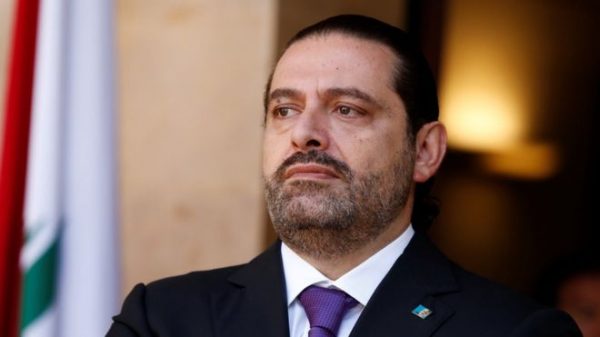 Prime Minister Saad Hariri said Monday that he will resign if the Hezbollah militant group refuses to accept a new power-sharing arrangement for Lebanon, speaking as consultations got underway in Beirut between political leaders over the government’s future.
Prime Minister Saad Hariri said Monday that he will resign if the Hezbollah militant group refuses to accept a new power-sharing arrangement for Lebanon, speaking as consultations got underway in Beirut between political leaders over the government’s future.
Hariri made his threat in an interview with the French broadcaster CNews.
The Iran-sponsored Hezbollah, which has representatives in Lebanon’s parliament, is the focus of talks between the country’s political parties on reaching an accord over representation and on limiting foreign interference in domestic politics. Hezbollah is an opponent of Hariri’s Saudi Arabia-backed Future Movement, though it’s also a member of Hariri’s coalition government.
Hariri said Hezbollah appeared receptive to dialogue, but said he would resign if the group and Iran did not agree to rebalance Lebanon’s political configuration. He did not elaborate on the new arrangement he was proposing.
Hariri announced he was resigning Nov. 4, but walked it back after returning home last week.
The original announcement, made from the Saudi capital of Riyadh, was widely seen as orchestrated by Saudi Arabia to pressure Lebanon’s politicians into taking stronger measures to contain Hezbollah’s influence. Hariri told CNews he wanted to send a “positive shock” through Lebanon through his resignation, and denied that Saudi officials forced him to resign.
Hariri has demanded that Hezbollah remove itself from regional conflicts, from Syria to Iraq and Yemen. Hezbollah denies playing a military role in Yemen but has fighters in both Iraq and Syria.
Lebanese President Michel Aoun met separately on Monday with several officials including the head of Hezbollah’s parliamentary bloc, Mohammed Raad, who later told reporters they discussed “reactivating” the government.
Raad wouldn’t answer questions about Hezbollah’s disassociation from regional conflict.
Christian leader Samir Geagea, a harsh critic of Hezbollah, told reporters after meeting Aoun that his group will not resign from the government.
“Disassociation should be in action and not through words, this means actively withdrawing from the region’s conflict,” he said, referring to Hezbollah.
Saudi Arabia and Iran are fighting proxy wars in the region and the conflict has affected Lebanon over the past years.
Hariri’s resignation came amid mounting tensions between Saudi Arabia and Iran. Saudi Arabia has accused Hezbollah of declaring war on the kingdom by supporting Yemen’s Houthi rebels, who fired a ballistic missile the night of Hariri’s resignation that was intercepted near Riyadh.
Saudi Arabia’s powerful Crown Prince Mohammed bin Salman told the New York Times last week that the bottom line is that Hariri is not going to continue to provide political cover for a Lebanese government that is essentially controlled by Hezbollah which is essentially controlled by Iran.
Hariri told CNews that he would be open to pushing forward elections in Lebanon, which are currently slated for May next year.
ABC News

Leave a Reply
You must be logged in to post a comment.